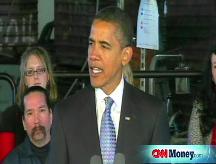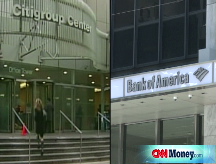GOP on stimulus: We want to be heard
House minority is presenting a united front in objecting to various measures in Dems' economic recovery package.
NEW YORK (CNNMoney.com) -- As Congress considers one of the most sweeping and expensive bills ever drafted under the tick-tock threat of rapid economic deterioration, the terms of the historic debate have been clearly drawn.
Let's talk about it, but talk fast, the Democrats say. To which the Republicans reply: We know it's going to pass, but hold on, we want some answers first.
Those lines were laid out at a marathon debate Wednesday of the House Appropriations Committee, which poured over a 258-page bill that proposes to spend $550 billion to jolt the economy.
On Thursday, the House Ways and Means Committee, which oversees tax policy, will meet to debate and amend the $275 billion portion of the stimulus package dedicated to tax cuts.
Democrats in the House - the Senate is likely to start digging into the bill next week -- say that the $825 billion recovery package crafted by President Barack Obama and House Democrats must be passed quickly.
They want the bill voted on by the full House next week and sitting on Obama's desk for enactment by President's Day.
"We cannot afford even one day's delay," said Rep. David Obey, D-Wisc., chairman of the appropriations committee.
Obey reminded members of the panel, which plays a critical role in doling out federal money, of the many dire scenarios economists have painted if lawmakers fail to act to stimulate the economy.
But Republicans, saying they have been left out of the process of putting together the package, aren't happy about being rushed into a vote on a bill.
They characterized Wednesday's meeting as likely to be their only chance to ask questions about the package.
"I don't question the urgency ... but the priorities and the price tag," said Jerry Lewis, R-Calif., the committee's ranking member.
The GOP makes many specific objections. The bill, say Republicans, does not include enough money for infrastructure projects that are considered "shovel ready" (meaning they could create jobs quickly). It also focuses too much on long-term spending programs, they say, which many Republicans characterize as worthwhile but not in the GOP's view a way to jumpstart the economy.
For example, the bill provides funding for special education programs. Republican member Mike Simpson, R-Idaho, said such funding is important but should go through the regular appropriations process.
"It sounds like we've said, 'What are all the good things we could do if we had ... $700 billion to spend,' " Simpson said.
Obey countered that "states and localities with the drop in revenue are losing their ability to fund education across the board," he said. Without federal funding, he said, that could lead to the layoffs of teachers, speech therapists, and others associated with schools' special-ed programs.
Republicans are also questioning a $15.6 billion measure to temporarily increase the maximum Pell Grant for undergraduates by $500, from $4,360 to $4,860. Democrats say that by making education more affordable, children and workers retooling their skills can be more competitive in the workforce.
But after two years, House Budget Republicans argued in a statement, "this funding vanishes, meaning a student attending school with the help of a Pell Grant will face a sudden and sharp decline in financial support." And, they say, while "spending on education ... may be worthwhile ... it will not provide an immediate stimulative impact."
And such funding "cliffs," they say, will put pressure on Congress to keep spending at elevated levels when various measures expire.
Republicans also questioned the stimulative value of some of the bill's smaller measures, such as $50 million in funding for the National Endowment of the Arts to preserve jobs in the nonprofit arts sector, and $650 million to extend a coupon program and consumer outreach to consumers with analog televisions so that they can get digital TV converter boxes.
Lastly, they expressed concern that some money allocated in the bill would be spent too slowly, in some cases over the next three or four years, rather than in the next year or two.
In the end, most Republicans concede the bill will pass but say they will continue to try to influence the final outcome.
Mike Pence, R-Ind., a leading House Republican, declined to say whether the package would get any Republican support if it didn't change significantly. Pence said he spoke to Obama at Tuesday's inaugural lunch and the newly sworn in president said he wanted to discuss a broad range of issues with House Republicans.
Meanwhile, House Minority Leader John Boehner, R-Ohio, said Wednesday that he had sent a letter to the White House requesting a meeting with Obama.
"We want to sit down with the president and talk about our ideas, because it's clear that trying to get money back into the economy quickly, to preserve jobs and to create jobs has to be the goal," Boehner told reporters. "And fast-acting tax relief, we believe is the best way to do that."
House Speaker Nancy Pelosi, D-Calif., said Thursday that Obama would hold a bipartisan meeting at the White House Friday to discuss the rescue plan.
- CNN Congressional producer Deirdre Walsh contributed to this report. ![]()



